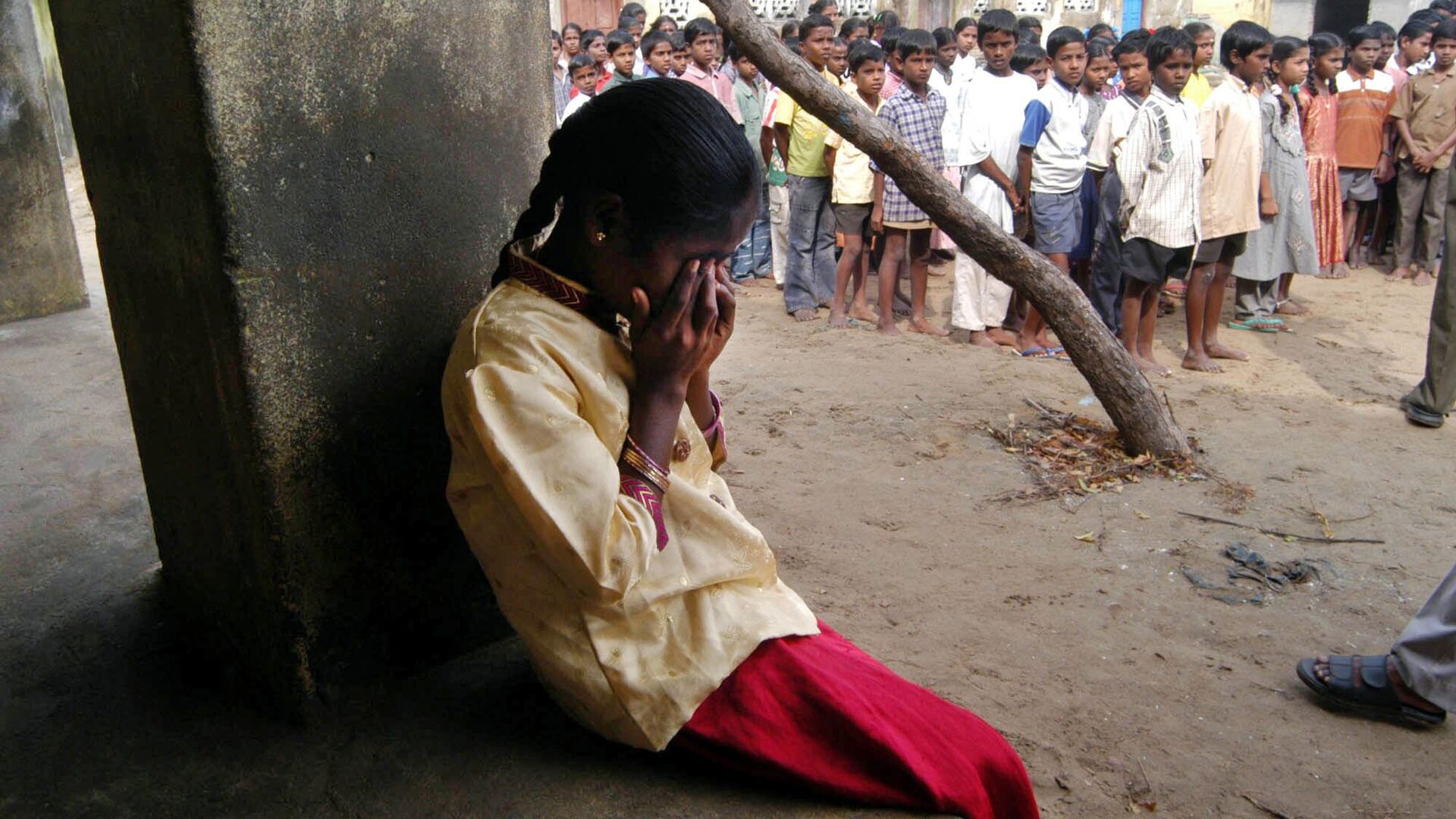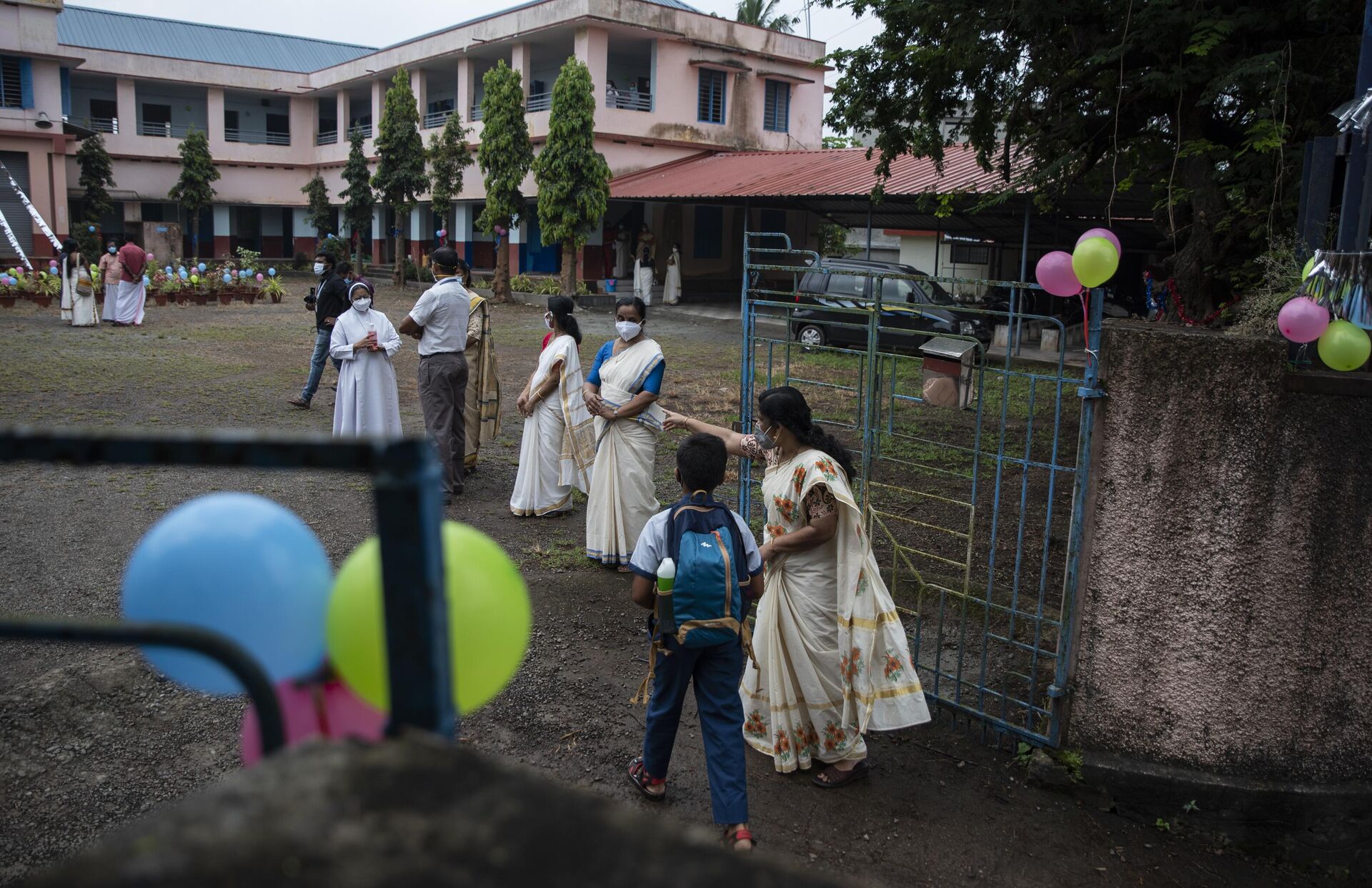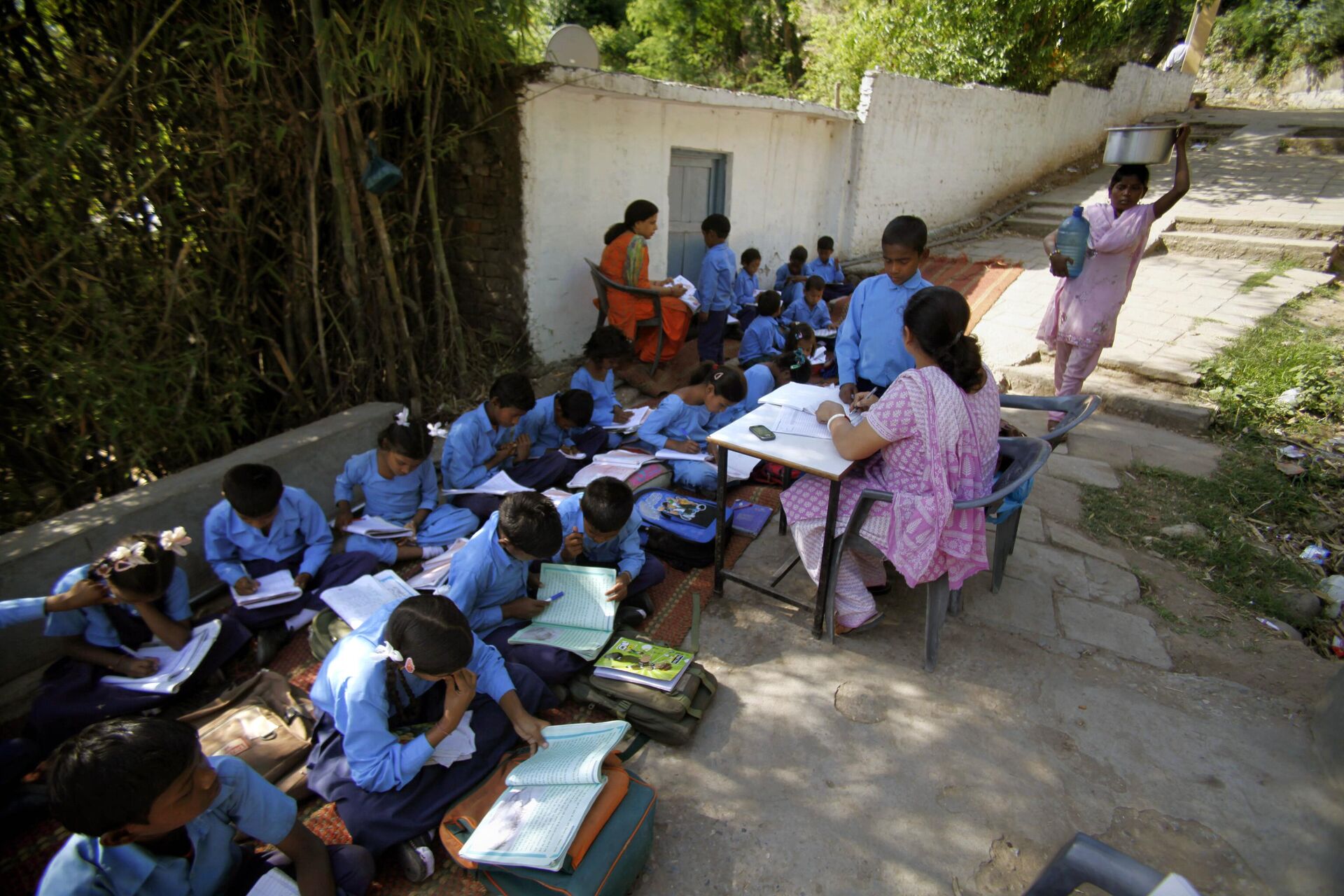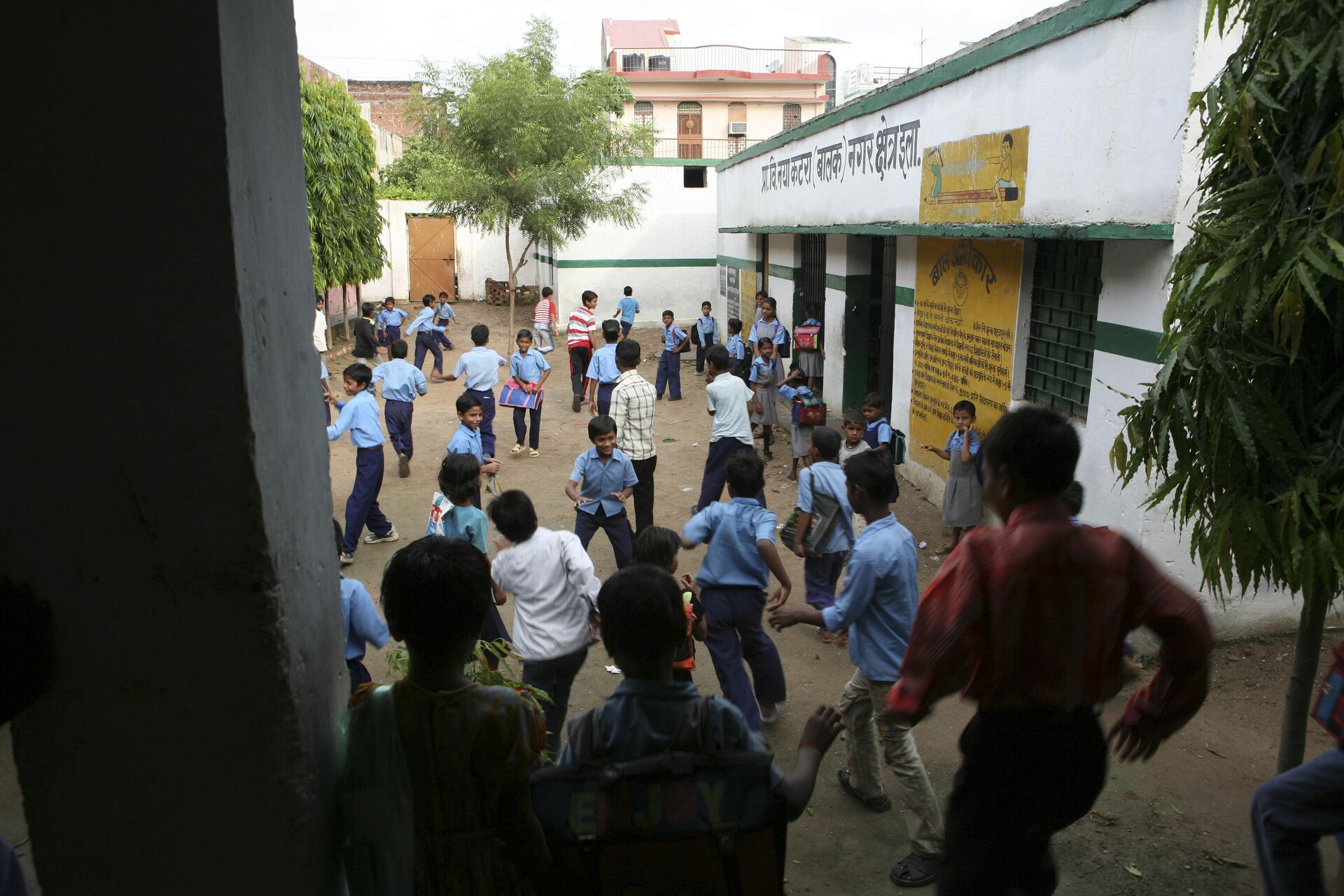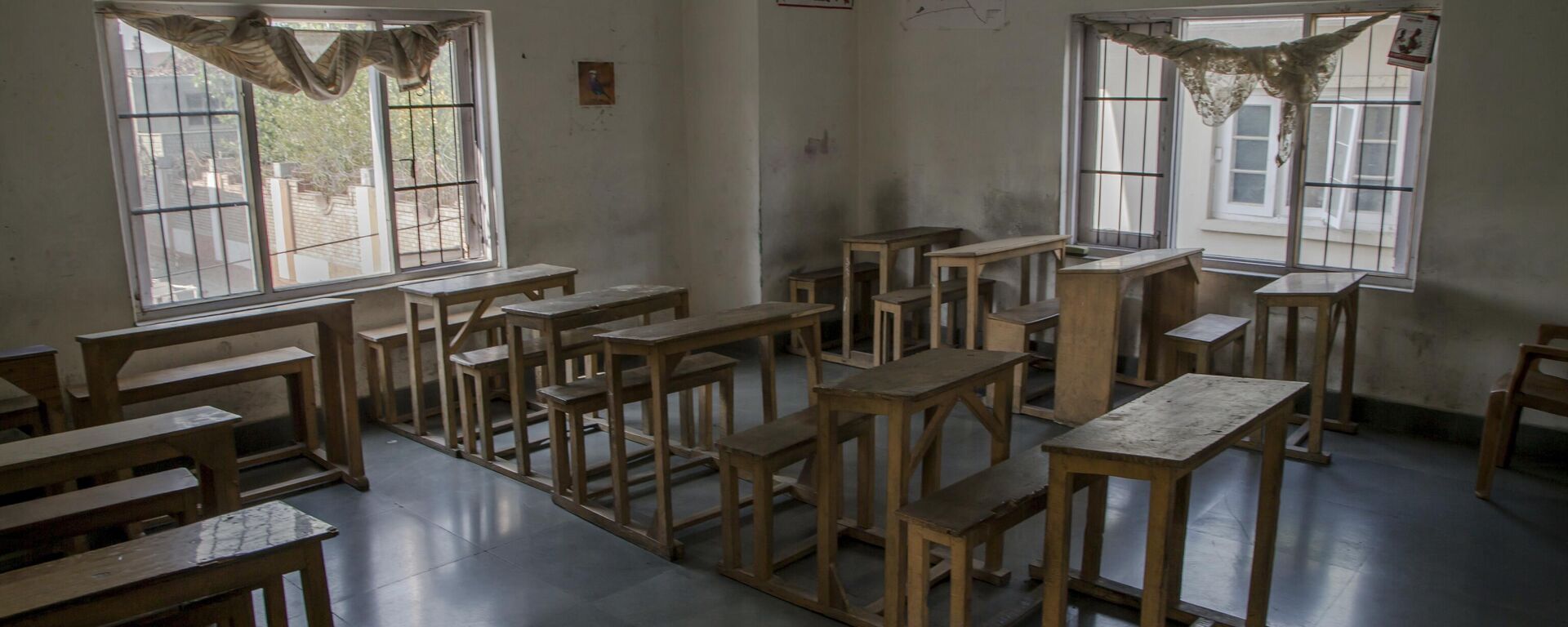https://sputniknews.in/20230916/corporal-punishment-is-your-child-suffering-in-school-4069390.html
Corporal Punishment: Is Your Child Suffering In School?
Corporal Punishment: Is Your Child Suffering In School?
Sputnik India
If the child suddenly starts behaving unusually at home, the parents should observe those signs immediately and explore likely reasons behind it. It could be due to a bulling or a corporal punishment, said Dr. Phukan from Assam.
2023-09-16T13:59+0530
2023-09-16T13:59+0530
2023-09-17T16:43+0530
india
delhi
education ban
school students
human rights
human rights violations
women's rights
assam
women's education
child labor
https://cdn1.img.sputniknews.in/img/07e7/09/10/4279495_0:102:2000:1227_1920x0_80_0_0_37249dc8b0c7e5a7f58dff5e6d0b8783.jpg
In modern society, there is a growing emphasis on cultivating children's curiosity and adopting innovative teaching methods. However, it is disheartening that some individuals still advocate for the use of corporal punishment as a means of disciplining children.Sputnik India conducted an investigation to understand the impact of corporal punishment on the mental well-being of school children and to assess the prevalence of this practice today.Corporal punishment encompasses various forms of physical discipline, such as spanking, tugging, twisting of ears or arms, and hitting with objects. These experiences can have a profound impact on a child during their formative years.Suffering in SilenceGarvit (name changed), a ninth-grader attending a school in the Mori Gate area run by the Municipal Corporation of Delhi, shared with Sputnik India the reality of facing punishment for even minor mistakes.He shared the troubling experience of school roll-call. If a student accidentally misses their name, the teacher engages in demeaning behavior. Rather than to show understanding, the teacher chooses to publicly humiliate the student by declaring they can't read, write, or speak well enough.Furthermore, trying to explain the situation regarding the fast-paced announcement leads to students being physically punished in front of their peers. Their valid explanations are disregarded as mere excuses or disrespectful retorts.The student revealed that they frequently endure physical abuse such as being beaten with steel and wooden sticks and hair pulling."Sometimes they isolate us in the classroom. No one is allowed to make a sound. If we do, they pull our hair and beat us with sticks," Garvit said."The sports teacher beats anyone found wandering on the school premises. Usually, we receive four beatings with a stick on each hand. Each powerful strike really hurts. Later, we are asked to bring our parents to school," he added."I Feel Like Beating the Teacher in Revenge"Dhairya (name changed), an 11th grade student of a Delhi State-run school, shared his experience with Sputnik India: "Once I was beaten black and blue by my teacher. He beat me while shaking me by my hair and slapped me several times."When asked what comes to his mind when the teacher gets violent, he said: "I feel like hitting the teacher in revenge. They beat us for no reason.''"In reality," Dhairya explained, "the boy insulted another boy, but the teacher believed it was directed at him. The teacher beat him without considering the truth behind the situation." Dhairya's tone betrayed the shock he felt at the teacher's behavior. He continued, "Even when the principal intervened he immediately sided with the teacher, disregarding the voices and well-being of the students involved."School CCTV cameras are occasionally checked, resulting in unfounded suspicions and unwarranted beatings of students. Further, students are wrongly accused of damaging water taps in toilet areas without camera coverage. These incidents often lead to warnings of exam disqualification unless students can prove their innocence.Teachers' DilemmaAanchal Sharma (name changed), a private school teacher in Delhi's Rohini area, addresses the concerns of frustrated parents in dealing with the "spoiled children".Is Child Punishment Public Entertainment?Questioning corporal punishment in schools, Swayam Prabha, a mother of two children in Delhi's neighboring city of Gurugram, said: "Just imagine a sensitive child being slapped or excessively scolded in full public view while their classmates sadistically enjoy the show.''She questioned the purpose of a teacher's professional training if they lack self-control, emphasizing that there is a difference between being disciplined at home by a parent and a teacher using corporal punishment to set an example.How Physical Violence Impacts Child PsycheDr. H.K. Phukan, Deputy Medical Superintendent of Pediatrics at Vivekananda Kendra, NRL Hospital in Assam, emphasizes the challenges children may face that can negatively impact their well-being.Nightmares may become a common occurrence among children, possibly stemming from their growing worries or anxieties. As a result, they may develop a reluctance to attend school, further exacerbating the issue. The lack of communication with busy parents could hinder their ability to express personal experiences, leading to a decline in their academic performance.He said such children may feel shunned, so they start having nightmares, can't sleep well and develop low self-confidence.What's on your child's mind?According to Dr. Phukan, when such incidents are reported, parents should monitor their children and look for signs of depression, distance, or irrational behaviour. "Apart from the physical injuries, the mental impact of such experiences may last up to six months or one year," he noted.He suggested that parents should spend a little more time listening to their children and understanding what they are going through.
https://sputniknews.in/20230826/school-teacher-asking-students-to-beat-up-muslim-boy-sparks-outrage-police-case-filed-3854164.html
india
delhi
assam
Sputnik India
feedback.hindi@sputniknews.com
+74956456601
MIA „Rossiya Segodnya“
2023
Sandeep Datta
https://cdn1.img.sputniknews.in/img/07e7/04/07/1468069_0:258:1800:2058_100x100_80_0_0_3909870b82375b0693e9fd27915facc3.jpg
Sandeep Datta
https://cdn1.img.sputniknews.in/img/07e7/04/07/1468069_0:258:1800:2058_100x100_80_0_0_3909870b82375b0693e9fd27915facc3.jpg
News
en_IN
Sputnik India
feedback.hindi@sputniknews.com
+74956456601
MIA „Rossiya Segodnya“
Sputnik India
feedback.hindi@sputniknews.com
+74956456601
MIA „Rossiya Segodnya“
Sandeep Datta
https://cdn1.img.sputniknews.in/img/07e7/04/07/1468069_0:258:1800:2058_100x100_80_0_0_3909870b82375b0693e9fd27915facc3.jpg
corporal punishment in schools, what is corporal punishment on a child, what is corporal punishment, corporal punishment examples, corporal punishment in india, is corporal punishment legal, effects of corporal punishment, types of corporal punishment, causes of corporal punishment, types of child abusing, physical abuse, ghaziabad school punishment, ghaziabad school abuse case, impact of corporal punishment in schools, what is corporal punishment, what is corporal punishment in schools, what is corporal punishment on a child, why teachers beat students , why do teachers beat students, why teachers are the worst, why are teachers so scary, why teachers should not hit students, how to prevent violence against child, violence against child in india, how to prevent child neglect, how to prevent child neglect, how to reduce child neglect, how to prevent childhood emotional neglect
corporal punishment in schools, what is corporal punishment on a child, what is corporal punishment, corporal punishment examples, corporal punishment in india, is corporal punishment legal, effects of corporal punishment, types of corporal punishment, causes of corporal punishment, types of child abusing, physical abuse, ghaziabad school punishment, ghaziabad school abuse case, impact of corporal punishment in schools, what is corporal punishment, what is corporal punishment in schools, what is corporal punishment on a child, why teachers beat students , why do teachers beat students, why teachers are the worst, why are teachers so scary, why teachers should not hit students, how to prevent violence against child, violence against child in india, how to prevent child neglect, how to prevent child neglect, how to reduce child neglect, how to prevent childhood emotional neglect
Corporal Punishment: Is Your Child Suffering In School?
13:59 16.09.2023 (Updated: 16:43 17.09.2023) ''If the child suddenly starts behaving unusually at home, the parents should immediately observe these signs and explore the possible reasons behind it. It could be due to bullying or corporal punishment,'' said Dr. Phukan from Assam.
In modern society, there is a growing emphasis on cultivating children's curiosity and adopting innovative teaching methods. However, it is disheartening that some individuals still advocate for the use of corporal punishment as a means of disciplining children.
Sputnik India conducted an investigation to understand the impact of corporal punishment on the mental well-being of school children and to assess the prevalence of this practice today.
Corporal punishment encompasses various forms of physical discipline, such as spanking, tugging, twisting of ears or arms, and hitting with objects. These experiences can have a profound impact on a child during their formative years.
Garvit (name changed), a ninth-grader attending a school in the Mori Gate area run by the Municipal Corporation of Delhi, shared with Sputnik India the reality of facing punishment for even minor mistakes.
He shared the troubling experience of school roll-call. If a student accidentally misses their name, the teacher engages in demeaning behavior. Rather than to show understanding, the teacher chooses to publicly humiliate the student by declaring they can't read, write, or speak well enough.
Furthermore, trying to explain the situation regarding the fast-paced announcement leads to students being physically punished in front of their peers. Their valid explanations are disregarded as mere excuses or disrespectful retorts.
"I experienced a difficult situation when I missed the attendance call. I explained to the teacher that I was following his instructions to take out my textbook, but he focused on my long hair and threatened me with a school haircut," he shared.
The student revealed that they frequently endure physical abuse such as being beaten with steel and wooden sticks and hair pulling.
"Sometimes they isolate us in the classroom. No one is allowed to make a sound. If we do, they pull our hair and beat us with sticks," Garvit said.
"The sports teacher beats anyone found wandering on the school premises. Usually, we receive four beatings with a stick on each hand. Each powerful strike really hurts. Later, we are asked to bring our
parents to school," he added.
"I Feel Like Beating the Teacher in Revenge"
Dhairya (name changed), an 11th grade student of a Delhi State-run school, shared his experience with Sputnik India: "Once I was beaten black and blue by my teacher. He beat me while shaking me by my hair and slapped me several times."
When asked what comes to his mind when the teacher gets violent, he said: "I feel like hitting the teacher in revenge. They beat us for no reason.''
He recounted an incident in which a student was beaten simply for standing in line improperly. "He was beaten by throwing him again and again. It went on for 30 minutes in front of everyone."
"In reality," Dhairya explained, "the boy insulted another boy, but the teacher believed it was directed at him. The teacher beat him without considering the truth behind the situation." Dhairya's tone betrayed the shock he felt at the teacher's behavior. He continued, "Even when the principal intervened he immediately sided with the teacher, disregarding the voices and well-being of the students involved."
School CCTV cameras are occasionally checked, resulting in unfounded suspicions and unwarranted beatings of students. Further, students are wrongly accused of damaging water taps in toilet areas without camera coverage. These incidents often lead to warnings of exam disqualification unless students can prove their innocence.
Aanchal Sharma (name changed), a private school teacher in Delhi's Rohini area, addresses the concerns of frustrated parents in dealing with the "spoiled children".
"During parent-teacher meetings, there are many who beg us to set their kids on the right track, to discipline them even by beating them. Parents buy them cellphones, spoil them with junk food, and want us to be saviors and help. Still, we avoid harsh measures," Sharma shared.
Is Child Punishment Public Entertainment?
Questioning corporal punishment in schools, Swayam Prabha, a mother of two children in Delhi's neighboring city of Gurugram, said: "Just imagine a sensitive child being slapped or excessively scolded in full public view while their classmates sadistically enjoy the show.''
She questioned the purpose of a teacher's professional training if they lack self-control, emphasizing that there is a difference between being disciplined at home by a parent and a teacher using corporal punishment to set an example.
"Today's kids are so informed, more tech-savvy than their parents or teachers. Is physical punishment the better recourse to manage such students than applying some psychological deterrents? Do schools wish to create an enabling environment or turn kids obstinate and be scared of studies? We send kids to learn from professionals not be beaten by them," she added.
How Physical Violence Impacts Child Psyche
Dr. H.K. Phukan, Deputy Medical Superintendent of Pediatrics at Vivekananda Kendra, NRL Hospital in Assam, emphasizes the challenges children may face that can negatively impact their well-being.
Nightmares may become a common occurrence among children, possibly stemming from their growing worries or anxieties. As a result, they may develop a reluctance to attend school, further exacerbating the issue. The lack of communication with busy parents could hinder their ability to express personal experiences, leading to a decline in their academic performance.
He said such children may feel shunned, so they start having nightmares, can't sleep well and develop low self-confidence.
"Psychologically, he may go to any level, even suicide. It's because after that incident there is no one to share with. His friends circle or peer group will make fun of him. The parents at first may not understand him due to busy lifestyle. So, he is totally cut off from the world and may go up to an extent (suicide)," he warned.
What's on your child's mind?
According to Dr. Phukan, when such incidents are reported, parents should monitor their children and look for signs of depression, distance, or irrational behaviour. "Apart from the physical injuries, the mental impact of such experiences may last up to six months or one year," he noted.
He suggested that parents should spend a little more time
listening to their children and understanding what they are going through.
"So, I stress that we should have at least one family meeting a week. We should sit together, play or go for a movie or just go into relaxing mode, we should have all those things to make everyone speak up," Dr. Phukan prescribed.
